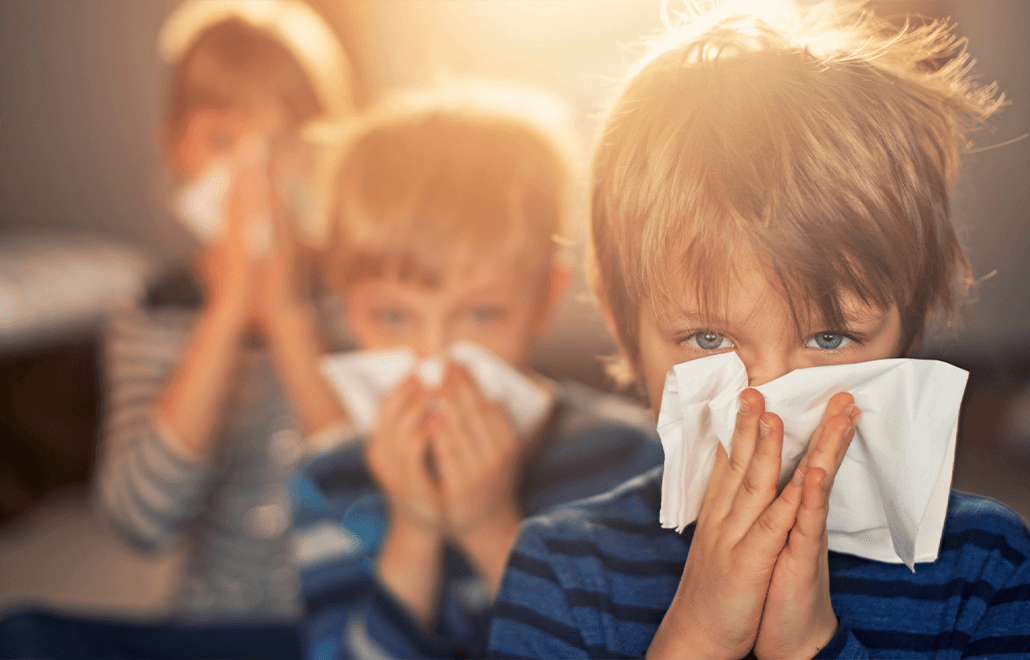
21 Jun Managing Your Child’s Allergies
3 min. readAllergies can significantly impact a child’s quality of life, affecting their physical health, emotional well-being, and daily activities. As pediatricians, we understand the challenges that parents face in managing their child’s allergies. In this blog post, we will provide you with practical tips and strategies to help effectively manage your child’s allergies and promote a healthy and happy life.
- Identify Allergens:
The first step in managing your child’s allergies is to identify the specific allergens triggering their symptoms. Whether it’s pollen, dust mites, pet dander, or certain foods, understanding the allergens will allow you to take appropriate measures to minimize exposure. - Create an Allergy-Friendly Environment:
Make your home an allergy-friendly space by implementing measures to reduce allergen exposure. Regularly clean and vacuum to remove dust and allergens. Consider using allergen-proof covers for mattresses and pillows. Keep windows closed during high pollen seasons and use air purifiers with HEPA filters to improve indoor air quality. - Allergy-Proof Your Child’s Diet:
If your child has food allergies, it’s essential to be vigilant about their diet. Read food labels carefully and avoid products that contain allergens. Educate your child about their food allergies and teach them to recognize potential allergens. Work with a pediatric allergist or a registered dietitian to create a safe and nutritious meal plan. - Medication Management:
In consultation with your child’s pediatrician or allergist, develop an allergy management plan that may include medications. Antihistamines, nasal sprays, and epinephrine auto-injectors are common medications used to manage allergies. Ensure that you understand how and when to administer these medications and keep them easily accessible. - Stay Informed:
Keep yourself informed about current research, treatments, and guidelines for managing allergies. Stay in touch with your child’s healthcare provider and attend regular check-ups to monitor their allergy symptoms and discuss any concerns or questions you may have. - Teach Your Child Allergy Awareness:
Empower your child to take an active role in managing their allergies. Teach them how to recognize allergy symptoms and what steps to take to minimize exposure. Encourage open communication about their allergies with teachers, friends, and caregivers to ensure they receive proper support and understanding. - Develop an Emergency Action Plan:
For severe allergies, it is crucial to have an emergency action plan in place. Work with your child’s healthcare provider to create a plan that outlines steps to take in case of an allergic reaction. Share this plan with family members, school personnel, and other caregivers to ensure everyone is prepared to respond appropriately in an emergency. - Promote Healthy Habits:
Maintaining overall good health can help strengthen your child’s immune system and reduce the impact of allergies. Encourage regular exercise, a balanced diet, and sufficient sleep to support their immune function. - Support from the Community:
Connect with support groups, online forums, and local organizations dedicated to allergies. These resources can provide valuable information, guidance, and emotional support for both you and your child. - Advocate for Your Child:
As a parent, you are your child’s advocate. Stay informed about their rights at school, such as creating an allergy management plan and ensuring a safe environment. Communicate with teachers and school staff to ensure proper accommodations are in place to keep your child safe.
Managing your child’s allergies requires a comprehensive approach that includes allergen identification, creating an allergy-friendly environment, medication management, education, and support. By following these tips and working closely with your child’s healthcare provider, you can help your child lead a healthy and happy life despite their allergies. Remember, Continuum Pediatrics is here to support you every step of the way. Together, we can ensure that your child thrives and enjoys life to the fullest, free from the limitations of allergies.

